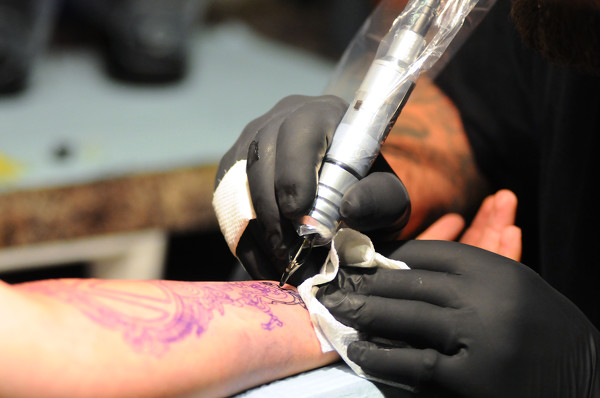Saturday, September 7th, 2019
Ink getting in the way
Sheriff may change tattoo policy to gain more job applicants
By William Kincaid

Photo by Leslie Gartrell/The Daily Standard
Paul Hayden, owner of The Brass Knuckle tattoo and piercing shop in Celina, works on a "Borderlands" video game-themed tattoo on Michael McIntosh, 19, on Friday afternoon.
CELINA - Mercer County Sheriff Jeff Grey is strongly considering relaxing his office's tattoo policy to encourage more people to apply for law enforcement positions.
Grey, who's now in his 19th year as sheriff, readily admits his dislike for tattoos.
"The older I get, the harder it is for me to change my mindset and for whatever reasons I've never been a fan of tattoos," he told the newspaper.
Personal preference aside, Grey highlighted the importance of law enforcement personnel's projecting a professional and friendly appearance to engender confidence and trust among the public, especially to those who have fallen victim to crime.
Yet Grey also acknowledges that younger generations are more apt to embrace or at least accept the idea of tattoos. Enforcing the law on the front lines is not a job for old men, he said.
"We have to hire young people," he added.
He too was quick to point out that he's grown to understand that for some, the designs inked into their flesh hold deeply personal meaning, whether that be a connection to or remembrance of a family member or military branch.
"I tend to have a soft spot for people in the military, and some of the people that we've hired that have been in the military, they turn out to be pretty good employees, most of the time," Grey noted.
Also, there's a more pressing, practical consideration to be made.
"It used to be law enforcement agencies had stacks and stacks of applications. When we would have an opening, we might have six or seven people that we thought would be really good for one opening," Grey explained. "It's not that way any more. I think law enforcement has come under attack. I think all law enforcement agencies struggle on hiring."
Looking to balance professionalism and public perception with changing societal practices, Grey said he'll likely move to permit sheriff's personnel to have a single visible tattoo on the inside of an arm.
"Where do we find the middle ground so that we can hire people, good people, (and) still maintain the respect of the public?" Grey wondered aloud.
Before changing the policy, Grey hopes to hear what the public thinks and encourages residents to give him their opinions.
"I work for those people out there, so I need to know what they think," he said. "But they also want me to have employees to send to them when they need help."
Prior to and for many years after first becoming sheriff, Grey said the office had a no-visible-tattoo policy.
"Obviously if they have them where they don't show in their uniform I wouldn't know," Grey said.
But beginning around 2010, Grey began to experience difficulty in finding job candidates.
"A lot of people were coming in and had small tattoos so they didn't fit the policy so we didn't hire them," he said.
He also questioned how many good people the office had passed over under the policy.
"I just wonder how many people maybe would have fit in here and been really good if we didn't have that tattoo policy," he mused.
He took his first step to freeing up the policy by allowing personnel to have a single tattoo on the arm - below the elbow but above the wrist - that "shall not be visible beyond a three-inch covering and shall not be exposed during normal movement for extended periods."
Hence, personnel could have one tattoo on their arm, but they had to keep it covered, either via watch or other device, coverup makeup, skin-colored medical type tape or bandage or skin-tone covering.
Grey is considering opening it up even further, allowing personnel to have a single tattoo on the inside of their arm no bigger than two-and-a-half inches in diameter. Grey said that figure was calculated as to cover most of the personnel who already have a tattoo that they cover up.
He stressed that no tattoos would be allowed on the face, neck, hands and fingers.
Tattoos could not be offensive or inappropriate, and personnel would need to have the design approved before being tattooed, Grey said.
"I think that I'm allowed to have a standard and go, 'This is what you need to look like,' " Grey said. "I can tell them how long their hair's allowed to be. I can tell them they can't have facial hair other than a mustache."
But Grey doesn't think he should be the ultimate arbiter.
"It might just be something that I don't like, and that's not fair," he said. "The other thing is I may not recognize something for what it is."
He suggested assembling a committee made up of people from multiple sheriff's office divisions and even the public to approve or reject tattoo designs.
Grey, though, doesn't foresee many problems arising from the type of tattoos his men and women want to have inked into their skin.
"I think the people that work here are proud of working here and proud of the image that we present," he said.
Deputy Don Sites, 27, has been with the office a little more than two years. He has a tattoo on his wrist that he conceals with his wristwatch. Asked what he thinks about the policy, Sites said he supports the idea of opening it up to a certain degree simply to allow for more men and women on the force.
He said tattoos are common among people his age, his friends and his family.
"My whole family is military," he said, noting that his brother has a soldier's cross tattoo stretching from his shoulder to his elbow.




